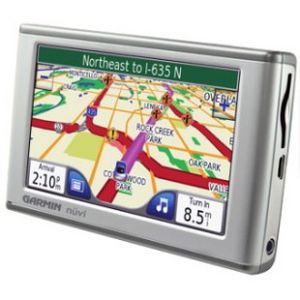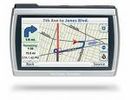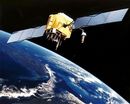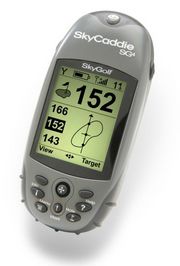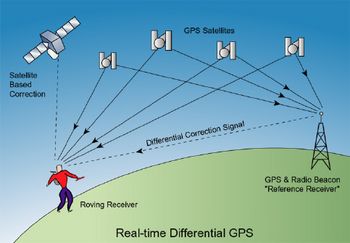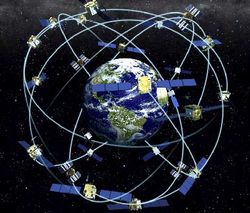What in the world is GPS!?
Contents
Team Information
Group Name: The Fearsome Fivesome
Group Members:
Ryan Boyd
Nicole Elliott
Amanda Machell
Mandeep Rahal
Rob Gillanders
Technology & Issue
Technology: GPS tracking devices
Issue: Although issues of privacy argue the growing technology of GPS, its benefits and potentials outweigh the concerns that it produces.
Initial Project Statement
Problem Statement: Technology is evolving at a rapid pace. No one can predict the latest, greatest advancement in our world and nothing is ever too small to be conquered in this century. When one thinks of the word GPS we directly relate it to those “machines” that can help us find our way when we get lost. GPS has evolved our sense of direction and given a new approach to the concepts of maps. It provides helpful information for simple everyday use in travels as well as complex weather forecasts. More importantly now it allows for wireless tracking allowing someone to remotely track ones location without them knowing. At one point in time the only way to track someone’s whereabouts was through the questioning of others if they had seen the person or writing letters that would sometimes take months to reach. This technology can be seen as a breakthrough in many aspects of our world as well as a breach of privacy.
Introduction (about GPS)
GPS stands for The Global Positioning System and is a tool used for navigation and scientific research. It was originally developed to help the various departments of the military to precisely locate their geographical location by the American Department of Defense in 1973. Currently GPS has become a household name in the lives of everyday people. It is used in cars, airplanes, boats and even the everyday hiking trips to give voice automated turn by turn driving directions, as well as displaying visual maps. It is also further used in the scientific world, particularly in conjunction with the environment. More specifically, meteorologists use the GPS system to predict weather forecasts and helps in studies of the climate.
GPS systems work by transmitting signals to and from satellites. The purpose of a Global Positioning System is used to transfer both locations of the receiver, as well as the exact current time. All systems are connect to atomic clocks and are therefore able to transmit signals without a significant time delay. The time delay occurs when one satellite is further away from another. The information that is given to the GPS receivers has been transmitted through 4 different satellites to ensure accuracy. However all GPS receivers need to be outside in order to be able to transmit signals to the satellites. Distance is measured by calculating how long a signal takes to reach the satellite from the time that it leaves the receiver. Some GPS systems are accurate within a 10-20 meter range, while others are accurate to the centimeter. GPS systems work 24 hours a day and in any weather condition. As technology develops the systems are upgrading into being more accurate, bringing the accuracy range closer and closer to being exact.
The following link takes you to a YouTube video that gives you a quick demonstration of how GPS devices are used:
http://www.youtube.com/watch?v=sZkgc2wSCzI
Argument
Introduction
GPS tracking is a remote way to track the whereabouts of someone discretely with or without their discretion. In today’s world this may be seen as a major advantage in tracking down criminals that the police view as suspicious as well as a major disadvantage when a spouse is secretly tracking the other spouse in suspicion of infidelity. GPS tracking seems to be perceived in a gray area where the opinion on the matter differs greatly. We believe that GPS tracking greatly outweighs the concern of privacy when there are many more situations in dire need of this technology. When skiers purchase their equipment they now have the option of purchasing jackets with GPS trackers placed inside of them. This may help in situations of skiers getting lost or stuck somewhere in the snow banks and the only way for them to be found in areas filled with nothing but snow is by their coordinates through the trackers. This is seen as a situation where the value of ones life outweighs the breach of privacy. We also feel situations where the police use the tracking system are very significant in that they are protecting the public from the dangers they may face from criminals. For example we see that sex offenders are eventually let out of jail and are free to continue their lives out in the world where they are surrounded by many temptations to falter again. The police may use these trackers to monitor their whereabouts in order to protect the community placing this is significant importance over the privacy of the sex offenders. One significant importance with the police using the tracking systems is that they cannot use them without a warrant. Warrants have to be obtained through a judge and are only allowed when the situation is determined to be by the judge. Even though many consider GPS tracking systems to be a breach of privacy, when it is used for all the right reasons it only brings protection and safety for the user and well as the people around them.
There may be negative sides seen to GPS tracking as not all good can come with any type of technology when used with the all the wrong intentions. Situations when parents are secretly tracking their children starting early on in their lives may be seen as placing the child in more harm than protecting them. Children as well as the parents may suffer when tracking their children for unnecessary reasons. The question is when do these parents stop tracking their children? When they reach adulthood when they are prone to do things that their parents are highly against. People may feel that a part of living in a democracy is to have complete privacy and freedom to do whatever they chose and GPS tracking is violating all of those rights.
It seems though even if GPS tracking is violating the privacy of the people its factors in the safety and protection of the public outweigh those concerns. The fact that is has contributed to much success in its use has proven that it is advantageous for all those who use it. GPS tracking systems have come a long way and will continue to prove to be efficient in their use to track criminals or people for their safety. The concern of violating privacy is minimal in comparison to the security you receive with the use of the GPS tracking systems.
Cons
Ethics and moral responsibility are the two main restraints of GPS and its uses. The technology advancements made over the last several years have lead to an alarming amount of tracking and information gathering devices that can be used without being discovered. This invasion of personal privacy is the biggest ethical problem with GPS. Devices range from small to large, can last from 4 hours to several days, and can be easily placed on people or vehicles to constantly monitor their every move.
Detrimental Uses:
• Businesses infringing upon consumer rights through GPS tracking to gather information pertaining to the uses of their products and the habits of customers
• Parents tracking children via hidden GPS locaters in jewellery, electronics or clothing
• Spouses tracking each other to find out about infidelity through hidden personal tracking devices as well as vehicular tracking
• Government tracking of unaware citizens through cell phones and use of government satellites to locate individuals
Below are specific examples of GPS products and how they can be used unethically to invade people’s privacy.
Hidden GPS Locators in Clothing

In 2007 a British company called Bladerunner released a GPS tracking jacket. In the liner there is a small GPS location device that is undetectable. This jacket can be purchased for both children ($500) and adults ($700). With a monthly fee of $20 the jacket and it the person wearing it can be tracked to within 4 square metres. The technology uses Google Earth Maps and updates location every 10 seconds also users receive emails or text messages that say if a boundary line has been crossed for example if a child is skipping class. The battery is rechargeable and last for up to 18 hours allowing parents or spouses to track the subject from the moment they wake up until they go to bed on one charge.
Vehicular Tracking via Real Time GPS

Covert vehicular tracking with GPS has become the new way to catch your spouse cheating. These devices can be pricey but can provide various information such as location, speed, and idle time. All of these things can helpful to concerned spouses and the driver will never be the wiser. These real time vehicular trackers can last for weeks, are available in various different makes and models from several companies and are readily available to the public.
GPS used to track rental cars and fine drivers

In 2001 Acme rent-a-car, a Connecticut car rental company, was sued by a customer after he was fined $450 for speeding three times. The company had used GPS tracking technology to monitor his vehicle’s movement and speed. Acme had hidden their GPS admission in the fine print of their contract. The lack of information concerning GPS tracking activities let it remain unknown as customers signed agreements and left. In early 2002 the Department of Consumer Protection ordered that Acme Rent-a-Car cease and desist. Their GPS tracking practices were terminated. All of these actions would have been acceptable if they had been more acknowledged and clearly put.
Pros
When it is useful
As GPS is a very controversial technology, with people arguing over conveniences and rights of privacy, we except that overall it provides benefits and potentials for society today and in the future.
Global Positioning Systems were originally developed in the early 90’s for use by the US military in the Persian Gulf War, and it presently plays a very important role in everyday life.
Positive uses of GPS technology include:
• It's use to accurately guide aircraft, spacecraft and ship orientation and movement patterns regardless of time of day or weather problems
• Professionals such as police, fire, and EMS frequently using GPS to determine the closest unit to an emergency, allowing for the quickest possible response to a potential life-or-death situations
• Allowing emergency personnel to pinpoint your location once you make an emergency call
• GPS-equipped aircraft used in combating dangerous forest fires by giving firefighters up to date information on the perimeter of forest fires while identifying hot spots
• Mapping, construction, surveying and geological companies use GPS technology extensively to allow for vivid exploration and navigation of areas where lack of visibility might normally inhibit these processes
• Companies using GPS monitoring to ensure efficient use of their fleet vehicles, public transportation systems, delivery trucks, and courier services
• GPS receivers that are being put in more and more automobiles now-a-days by manufactures for both passenger safety and luxury.
• Hand-help GPS technology. It is becoming more common and is not only useful but is also becoming a fad. These fads are found in GPS handheld devices such as iPhones and Blackberrys. These handheld devices are useful in determining not only the proper route to take while driving but also how many and the locations of certain points of interest on route such as: restaurants, ATM’s, churches, museums, sports facilities, tourist attractions, golf courses and theme parks.
• The vast number of ways the scientific community uses GPS technology for example: GPS balloons to monitor holes in the ozone layer and air quality across the world, GPS buoys equipped to detect oil spills and aid in the clean-up process, archeologists searching for ancient ruins, biologists analyzing migration of various species, geologists and explorers studying the earth’s many diverse landforms and by researchers for use in a variety of other applications.
• Professional athletes using GPS technology. For example, professional golfers use it to get an exact distance to certain hazards and pin locations from their ball in order to make an appropriate club selection.
• Use in various recreational activities which could be enhanced by the use of GPS. For example, there are GPS units available specifically for use while fishing which include fishing and hunting schedules for the best days and times to fish and which species are in season.
The following positive uses of GPS are described and analyzed in more detail to shed even more light on the different ways this technology can be used beneficially:
GPS in Sports Clothing

As Global Positioning Systems (GPS) technology has become more popular over the past couple years, more people are relying on it to keep them safe. The progress of this technology has allowed the average person to own it, as it is now easy to use and very affordable. The most popular form of GPS clothing can be found in extreme sports equipment, such as skiing/snowboarding and mountain hiking, where a small GPS transponder is sewn into the equipment to allow tracking in almost any situation, such as avalanches or blizzards. Some snowboarding jackets today are even equipped with navigational tools and LCD screens, allowing the wearer to get back on track if they become lost, or to meet up with friends who also wear the GPS clothing. This technology also allows people to manage the intensity and duration of their activity, by showing the distance and velocity of the movements of the user. GPS clothing is a relatively new technology with growing potential, and gives people the luxury of security, no matter where they are. As this technology continues to gain popularity, however, concerns with privacy issues and unwanted tracking create possibilities of attaching a negative image to this product.
GPS Maps

Whether you are driving, boating, hiking or doing anything that requires a specific route to be taken, GPS maps can be a lifesaver. Often called “the cheater’s map”, this technology has been proven to be the best choice in almost any situation. With regular paper maps, there is a risk of relying on data that could be year’s old, and inaccurate information could be time consuming. GPS maps on the other hand are very reliable, as they use real-time satellite data to ensure that you have a map that is up to date. The ability to customize your GPS map to a specific trip eliminates the risk of trying to read a paper map while driving, which can be extremely distracting and cause dangers to yourself and other drivers. Some models of GPS maps even include voiced driving instructions, which further eliminate the chance of being distracted on the road. Another benefit of GPS mapping is the ability to store many map locations on one single device, omitting the need to carry around several paper maps. Tracking progress and retracing your steps are also benefits of GPS maps that allow the user a more convenient travel. If you’re the kind of person who prefers to be well informed and organized, then transitioning from paper to GPS maps would save a lot of time when planning out your next trip.
Traffic Control (using GPS)

Although GPS systems are just starting to grow in producing accurate traffic reports in major cities, there is much potential for this technology in the future. As more and more people are using GPS in their vehicles, live information could be sent directly to their device, warning them of congested roads and suggesting alternative routes. This would also be of great use for emergency situations, as response crews could easily determine the fastest route possible by avoiding heavy traffic. This concept of traffic control would not only save time and provide convenience to drivers, but would also make roads safer and more efficient.
GPS in aiding Weather forecasts

Although predicting the weather has never been something exact, GPS technology is helping meteorologists become more accurate when coming up with weather forecasts. As signals from GPS receivers pick up variations in temperature, pressure and humidity, these measurements can then be manipulated to determine what is going on in the atmosphere. By having an accurate knowledge of the weather in the location you are traveling to, you can feel safe and make possible modifications to your route if you see that weather is not acceptable. Scientists are continually modifying this technology to produce more accurate weather predictions, as there is still much potential in this field of GPS systems.
GPS Tracking used for tracking criminals

In the article “Should the Police track your every move?” it presented a very interesting case about a man named William Bradley Jackson who was convicted of murdering his daughter after the police secretly placed a GPS tracker on his vehicle. Through the technology they were able to track him when he went to dig up his daughter’s body from the original location he had used and moved it to another location so that would be harder for anyone to fine. The GPS tracker allowed the police to bring forth this instance as solid evidence to convict him of his daughter’s murder. Fortunately, they did have several types of warrant when they placed the tracker on his vehicle and hence when he challenged the Washington Supreme Court saying that the Police have no right to GPS devices at their own discretion he was not successful in his appeal. This sparked heated debates about whether the police have the right to use these devices without the discretion of the person. The bottom of the matter is that the police have a job of protecting the public from any harm. Now people may think that this may violate their rights if the police are tracking them but they can only do it with good reason. Laws have been out in place so that police must obtain a warrant from a judge based on solid grounds that a tracking device is needed to help combat crime. This is the only way police can actually track a person demonstrating that the police does have every right to track your move if they suspect you of wrongdoing.
GPS for future use in the Calgary Transit System

As a new proposed technology, programmers will be able to improve the way in which we commute through the use of GPS technology. Through the placement of GPS systems in both the transit buses and trains it provides information to the commuters. As the busses move throughout their route an interactive webpage can allow you to visualize where your bus is at any given time. This allows for a more accurate estimation of time of arrival. This technology would also be extended to the trains as well. Another aspect that this system would allow for would be the transmission of information through 10 and 5 minutes before the bus will arrive through text messaging. This technology has been recently proposed to the City Transit Company and has been accepted to hopefully be implemented into each bus. However, currently the technology has been only developed into a demonstrative stage, the transit system is just beginning further development in this technology to better suit their needs.
Conclusion
The positive examples above account for only a fraction of the many ways of how GPS technology is used across the planet to maintain efficiency, ensure safety and gain knowledge of the world around us. GPS has become an important application for not only the military, but also gives numerous advantages to worldwide users. The GPS industry is growing at a very rapid rate, and with it are the beneficial and ethically wrong uses of the technology. As we have proved, the countless examples of beneficial GPS usage greatly outweigh the potential ethical issues associated with specific uses of the technology, which will allow it to continually grow in the future.
References
Ryan
1. http://scign.jpl.nasa.gov/learn/gps1.htm
2. http://en.wikipedia.org/wiki/Global_Positioning_System
4. http://www.colorado.edu/geography/gcraft/notes/gps/gps_f.html
5. http://www.howstuffworks.com/gps.htm
6. http://www.trimble.com/gps/index.shtml
7. http://arstechnica.com/news.ars/post/20080513-gps-tracking-of-truants-privacy-vs-practicality.html
8. http://www.pocketgpsworld.com/privacyfuture.php
9. http://library.findlaw.com/1999/Jul/2/130417.html
10.http://www.divorcenet.com/states/new_jersey/spying_on_your_spouse
11. http://ezinearticles.com/?Tracking-Your-Cheating-Spouse-With-GPS&id=1073807
12. http://www.aero.org/education/primers/gps/uses.html
13. http://www.computerworld.com/action/article.do?command=viewArticleBasic&articleId=9023359
Mandy
1. http://gpstrackingsystems.biz/category/gps-tracking-and-privacy/
2. http://news.zdnet.com/2100-9595_22-101530.html?legacy=zdnn
3. http://arstechnica.com/news.ars/post/20080513-gps-tracking-of-truants-privacy-vs-practicality.html
4. http://www.squidoo.com/gpstracking
5. http://www.businessweek.com/2000/00_39/b3700104.htm
6. http://atheism.about.com/library/FAQs/phil/blphil_eth_gpstracking.htm
7. http://www.flixya.com/post/tommy999/554089/Cell_Phone_GPS_Tracking_-_Privacy_Issues
8. http://www.wirelessdesignmag.com/ShowPR.aspx?PUBCODE=055&ACCT=0000100&ISSUE=0404&
9. http://library.findlaw.com/2003/Dec/1/133470.html
10. http://gps-vehicles.blogspot.com/2008/03/gps-tracking-devices-teens-vs-parents.html
Nikki
2. http://www8.garmin.com/aboutGPS/
3. http://www.gpsreview.net/gps-navigation-systems-enhance-safety/
4. http://www.colorado.edu/geography/gcraft/notes/gps/gps_f.html
5. http://allgpstracking.net/gpstracking/index.php/gpstrackingprivacy
6. http://library.findlaw.com/1999/Jul/2/130417.html
7. http://arstechnica.com/news.ars/post/20080513-gps-tracking-of-truants-privacy-vs-practicality.html
8. http://www.legalaffairs.org/issues/July-August-2003/feature_koerner_julaug03.msp
9. http://www.nytimes.com/2007/10/23/technology/23mobile.html?_r=2&oref=slogin&oref=slogin
10. http://www.gpscentral.ca/products.htm
Amanda
1. http://ezinearticles.com/?Cell-Phone-GPS-Tracking---Privacy-Issues&id=159255
2. http://wiki.media-culture.org.au/index.php/GPS_-_Privacy_Issues
4. http://www.cbc.ca/news/story/2006/12/01/privacy-gps.html
6. http://www.mobilein.com/reports/AC/GPS_PrivacyRegulatory.php
7. http://www.msnbc.msn.com/id/10089674/
8. http://www.cbc.ca/news/background/tech/gps-privacy.html
9. http://www.privcom.gc.ca/media/nr-c/2006/nr-c_061130_e.asp
10. http://www.gpsindustries.com/aboutus.asp?page=privacy
11. http://www.presseagentur.com/interactivewear/detail.php?pr_id=832&lang=en
12. http://www.gpstrackingdevice.net/GPS-Map-Advantages.html
13. http://wiki.answers.com/Q/What_are_advantages_of_global_positioning_systems
14. http://www.helium.com/items/798584-advantages-of-gps-technology
Rob
1. http://www.talkleft.com/story/2008/7/2/195035/3943
2. http://www.rmtracking.com/spousetracking.html
4. http://www.cbc.ca/news/story/2007/10/25/gpsjacket.html
5. http://www.trackingtheworld.com/products.htm
6. http://www.vs.inf.ethz.ch/publ/slides/ukubinet2004-langhein.pdf
7. http://www.acme-journal.org/vol4/ADP.pdf
8. http://www.brickhousesecurity.com/gps-car-tracking-vehicle-logging.html
9. http://www.positrace.com/?promo=GoogleNov2008&gclid=CM7SppeImZcCFSCcnAodLBrC-A
